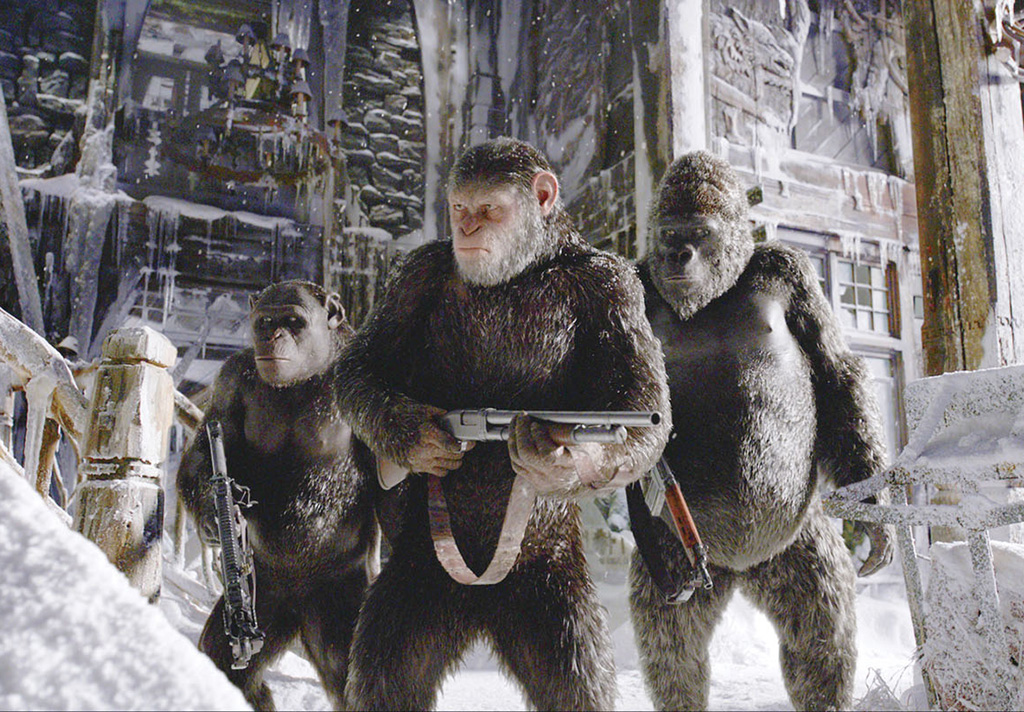Review: “War for the Planet of the Apes” is absurd and boring
The (presumed) final installment of the latest "Planet of the Apes" series is a plodding, lumbering, insulting bore

To fully comprehend how far War for the Planet of the Apes — the third and not very likely final installment in a film series reconstituted from the ’60s — sinks, one has to do a little excavating, back to the 1968 original. In Planet of the Apes, based on a novel by Pierre Boulle, Charlton Heston played an astronaut stranded in a world populated by feral, mute humans and fully-clothed, walking, talking simians. The film gave cinema one of its most enduring lines — “Get your stinking paws off me, you damned dirty ape” — and one of its greatest reveals: that Heston was on Earth all along. Just way, way, way in the future.
The original film is notable for any number of things, including its grim outlook for humanity, a theme that Heston became poster boy for in the subsequent, equally nihilistic sci-fi films The Omega Man (1971) and Soylent Green (1973). Yet that first Planet of the Apes is most revered for its makeup, designed by the legendary John Chambers. Though primitive by modern standards, it never fails to mesmerize, and is only enhanced by the superlative, resonant performances of Roddy McDowall, Kim Hunter, Maurice Evans, and James Whitmore, who bring their monkey-derived personas to glorious life.
From that first film, four others were born, all of diminishing narrative returns. But it’s the third film in the series, Escape from the Planet of the Apes, that jumped the orangutan. It attempted to explain how intelligent apes came into being by using time-travel as a seeding device, creating an impossible loop that presents the chicken and the egg as a simultaneous occurrence.
Tim Burton only made things worse in 2001 when he attempted to reboot the series with a literal remake of the 1968 film, tacking on an ending that pushed the time-travel seeding to an extreme that was more like a big FU to audiences. So it was with pleasant surprise when, in 2011, writers Rick Jaffa and Amanda Silver overhauled the storyline with Rise of the Planet of the Apes. They put some actual thought into the circumstances, and created an origin story that felt entirely plausible. Director Rupert Wyatt brought satisfying emotional density to Rise, and while the tangible makeup effects were supplanted by CGI, the producers were smart enough to hire the best motion-capture actor in the business — Andy Serkis — to portray Caesar, the chimp who would be king.
Then Matt Reeves entered the picture and things took a downward spiral. His 2014 Dawn of the Planet of the Apes was neither as rich nor resonant as Rise, but it at least found a way to remain narratively engaging by focusing on conflicts within the ape brigade. Dawn, however, was a bridge to War, a point made abundantly clear in the new film’s opening minutes, which recap the first two films using title cards that border on infantile. It’s not a good sign when you talk down to your audience in the first two minutes.
Reeves, who serves as both director and writer, clearly fashions himself an important filmmaker with something profound to say about humanity’s propensity for evil, about its disregard for animal rights, about its fear of anything foreign. But his words ultimately signify nothing. He’s a hack, and his film, a hack job.
Bloated, ridiculously long, and dull, War for the Planet of the Apes (★) tries hard — oh, so hard — to be something of consequence. But it’s a massive, expensive nothing of a movie, an example of what happens when imagination is stripped from the equation and replaced with a collection of badly-executed homages to war movies of yore. The film pretends to bring closure to the apes versus humans conflict, but it’s clearly a setup for an eventual reboot of the 1968 film. For proof, look no further than the introduction of two of the most important characters from the Heston original: Nova and Cornelius.
The apes are once again commandeered by Caesar, and Serkis gives a simmering, gravity-laden portrayal that tries to rise above the cliched storyline. The humans, meanwhile, are led by a psychopathic soldier known only as The Colonel. Woody Harrelson, devouring every bit of scenery as though he were a starving man presented with a half-gallon of Ben & Jerry’s Chunky Monkey, fully demeans himself for having accepted the role.
Essentially, the film is a kind of “Great Apescape,” as the oppressed simians, caged and forced into hard labor by The Colonel, find the courage and resolve to rise up against the guys with the bullets and bombs. There’s a lone moment, near the end, when things get genuinely interesting. As the apes are confronted by a gargantuan army dressed in Stormtrooper knockoffs, Reeves has an opportunity to get clever and pull out all the stops. Instead, he gets lazy and pulls out a deus ex machina. It’s beyond shameful. It’s insulting.
War of the Planet of the Apes weighs itself down in self-admiration for its CGI effects (yes, the apes are remarkably well-animated, but for my money, the makeup in both the original and Burton’s remake is more impressive, if not for execution, then at least for effort). And it weighs itself down in absurd self-importance, using Nazi Germany’s concentration camps and American Japanese internment camps as its allegorical base. The film lies there, like a drowsy, 800-pound gorilla. Toss it some bananas and call it a day.
War for the Planet of the Apes is rated PG-13 for violence. Opens Friday, July 14, at area theaters.
Support Metro Weekly’s Journalism
These are challenging times for news organizations. And yet it’s crucial we stay active and provide vital resources and information to both our local readers and the world. So won’t you please take a moment and consider supporting Metro Weekly with a membership? For as little as $5 a month, you can help ensure Metro Weekly magazine and MetroWeekly.com remain free, viable resources as we provide the best, most diverse, culturally-resonant LGBTQ coverage in both the D.C. region and around the world. Memberships come with exclusive perks and discounts, your own personal digital delivery of each week’s magazine (and an archive), access to our Member's Lounge when it launches this fall, and exclusive members-only items like Metro Weekly Membership Mugs and Tote Bags! Check out all our membership levels here and please join us today!























